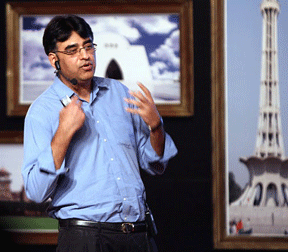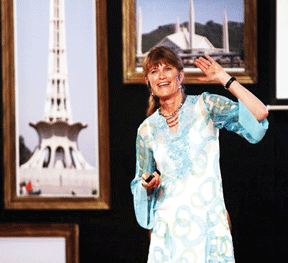In the marketplace of ideas only the best must survive. TEDx, Pakistan, failed its own philosophy. It wasn’t that the ideas were poor. It was the packaging, the presentation, and the speakers’ choosing to talk in banalities, rather than true struggles against systemic problems that go beyond band aid solutions. Whenever something is marketed as innovative, it is already too much pressure on the speaker. In trying to perform TED, the speakers ultimately lost out on the message.
I noticed most reviews about the talks were positive. The dissenters were largely silent, and this would have worried me, except this is Karachi and people are cautious about who they offend, and allergic to negativity, even if it is constructive. One of the common reactions was how it provided optimism in a time of bleakness. Pakistan, in particular, with the war and the suicide bombings is in desperate need for hope. But were what the speakers saying actually giving us cause for hope? Were they intelligently ushering us out of this bleakness?
The audience was selected upper middle class liberals who wield some power in Karachi’s society, either because they own financial capital or have the education that gives them clout. The venue was suitably the Southend Club exceptional in its exclusivity with membership fees of several lakhs.
Roshaneh of Kashf Foundation talked about microfinance. In 2010, we are already aware of how microfinance functions. What would have been innovative was how we overcome its limitations, handle criticisms against it. The critics allege strong arm tactics are often used to recover payments, some are using money to buy food. It cannot promise structural change – an authentic, reflective dissection, perhaps, of what Kashf’s own experience has been. Instead Roshaneh delighted in how capitalism must be inclusive of the poor, and expressed her desire to see Kashf shares traded on Nasdaq. Now to anyone who is not wedded to the notion that capitalism brings salvation to the poor, how does that come across as anything but a cynical technique to make markets out of the poor that ultimately benefit lenders and entrepreneurs?

Then the singing of the anthem. I was at the SOS village last week and sang the national anthem with orphans and ten year olds. That was a space where it was appropriate. Not TEDx. Why assume that people share patriotism, rather than a vision of justice? The two can’t be conflated especially in a time when many are struggling against the state’s violence and repression, and for whom the fiction of national loyalty takes on a completely different meaning.
Sustainability and scaling are the buzzwords for social entrepreneurs. Projects must grow and stand on their feet. But how about talking about it also in the context of Pakistan’s economy? Monis Rahman, Founder/CEO, Naseeb Networks, was not able to succinctly present why his project is a good idea because he was too focused on using metaphors that fell flat: Archimedes’s leverage, marshmallows, and toothpicks. In the end that was what it was about. An unemployed person who makes a phone call and speaks to a disembodied voice in Punjabi or Pashtu and that directs him according to vocation, without more, is unimpressive. An American dream in a Punjabi village, but ultimately vacuous if you have not anticipated the discourse and prepared for it in a forum where there are no questions from the audience. Is this what the economy needs? Help for job seekers or rapid growth in local industry, reforms in agriculture and land ownership, end to privatization? How does your project fit in?
Asad Rezzvi, CEO, e-Cube Global, similarly, was unpersuasive. He came in as an inspirational speaker. He used 9-11to explain how he was able to facilitate dialogue by saying even the most provocative things in the wake of the disaster, and in a largely white American, Christian audience. But I was expecting something a little more edifying than lessons about speaking honestly and being present in the moment. He used 9-11 to make a point, but he must know that its horror does not impact people in Pakistan the same way. We barely keep up with our own – May 12, Bolton Market, bombs in the Ahmedi mosque.

This was the second time I have heard more or less the same speech from Jacqueline Novogratz, Founder & CEO, Acumen Fund. She is humbled by the warmth and generosity of the people of Pakistan. She described how Daniel Pearl was killed during one of her Pakistan visits but implied that she sees Pakistan rather differently, as a place where change is possible. It is time we moved beyond appraisals of how hospitable we are and from paradigms that are always challenging, and thus buying into, the foreign media construct of Pakistan as a country of terrorism.
Dr. Sonu and Tasneem Siddqui have built projects that have helped the people of Thar and those affected by Pakistan’s housing crisis, and her speech resonated if you are familiar of the gaps filled by the work of these two individuals.
CEO, Engro Corporation, Asad Umar’s talk could have been better with more instructive slides. His talk was content rich, but he did not communicate exactly what the challenges were that they were trying so hard to fight. We understood that 4% of Thar coal’s potential to provide all of Pakistan’s energy needs is an attractive proposition. But we do live in a country where companies are sold and privatized under cover of dark, where industries routinely ignore the rights of the indigenous and the poor. He did not develop how this will impact the people of Thar. I have no doubt that Asad is committed to the morality of coal exploration but is there an institutional commitment? Let’s move beyond this and talk about our corporate culture.
The novelty and optimism should be not in that we can find a first world space where we can showcase super models and geniuses but in actually presenting ideas , modestly and crisply, that will pave the way for structural change.
At the very least, the presenters could have told uplifting stories of the beneficiaries. That would have been obvious and clichéd; but given that they chose instead slides with corporate jargon like maximization and success, it would have been more grounded.






Are the talks on Youtube?
Typical Pakistani elitist attitude, all talk, all pomp and lets sing the national anthem while we’re at it. Ask them to roll up their sleeves and get to work where it really matters, and they run towards their SUVs and speed off into the sunset.
@Bilal The author pens the truth… Take off your rose colored glasses.
Pakistanis want romance. TedXkarachi started with Eat, pray, love. I think that defines, the talk, our lives, our country. Partially atleast. This is how the establishment would have us live….singing the national anthem.
This TedX disappointed – it was reminiscent of the MIRC days when the blind date would seem real hot on chat but just not be all that in real life ;)
I thought the talks were all fantastic. The author is clearly a cynic, critical of everything and everyone. This is fairly typical of lawyers and academics whose careers lies on finding loopholes and faults in order to distinguish themselves. What Pakistan needs now is to flush this kind of cynicism down the toilet.